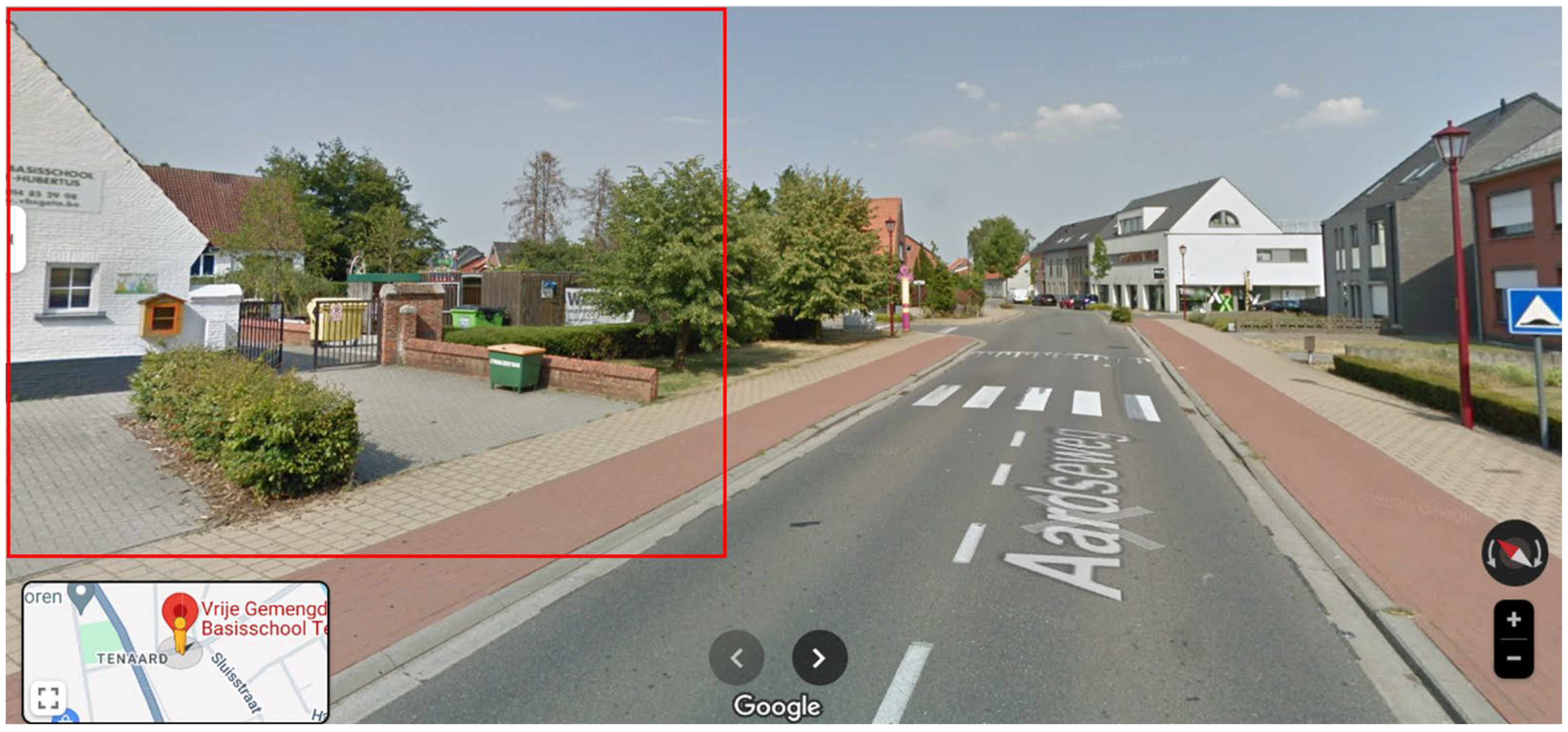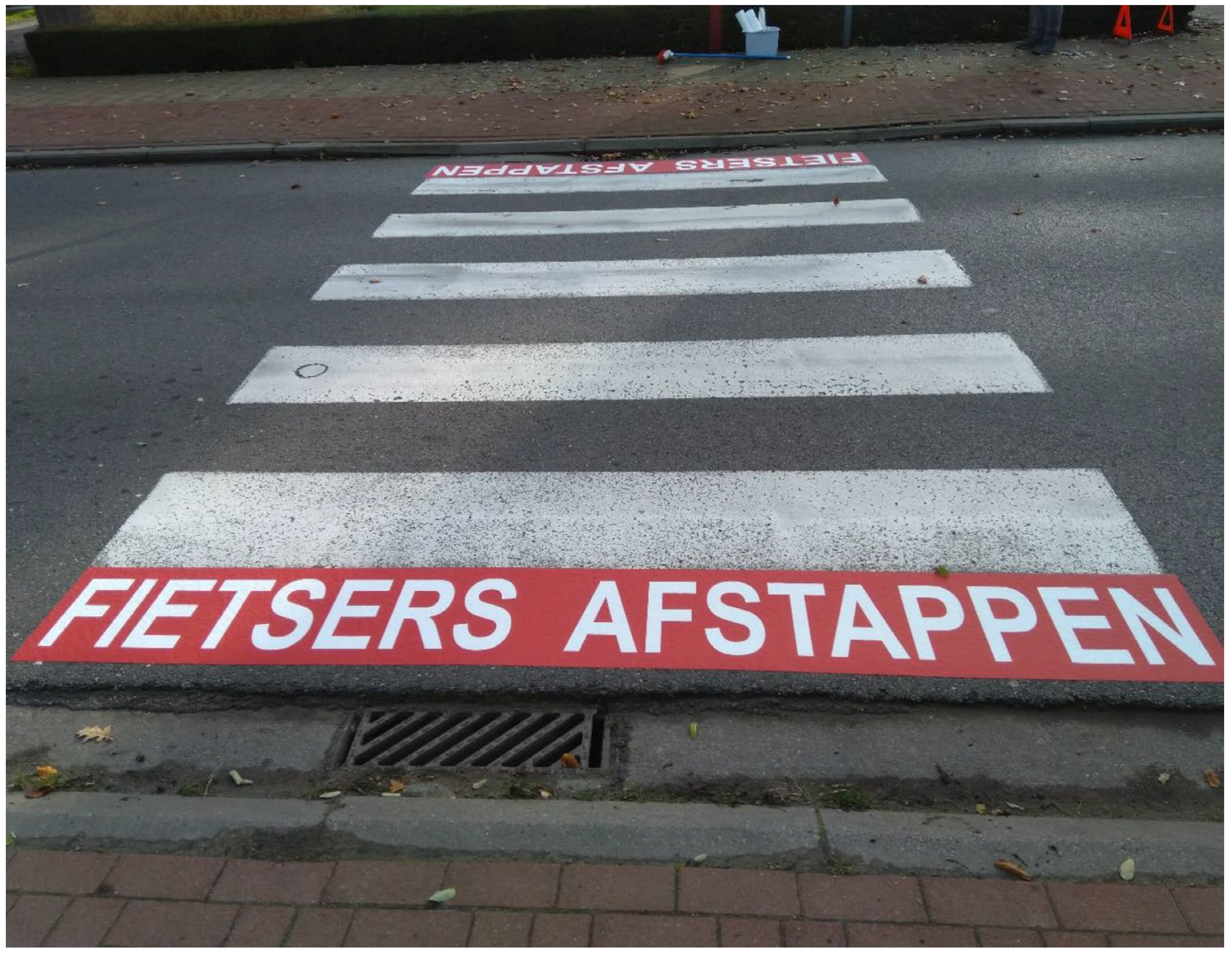Nudging Safety in Elementary School Zones: A Pilot Study on a Road Sticker Intervention to Enhance Children’s Dismounting Behavior at Zebra Crossings
Abstract
1. Introduction
- To observe the crossing behavior of elementary school children with bicycles within the school vicinity.
- To examine the effectiveness of a nudging approach in improving the crossing behavior of elementary school children.
- 3.
- To examine whether accompanying adults also adjust their behavior by holding their children’s hands more while crossing.
2. Materials and Methods
2.1. Preliminary Observation
2.2. Intervention
2.3. Data Analyses
3. Results
4. Discussion
5. Conclusions
Author Contributions
Funding
Institutional Review Board Statement
Informed Consent Statement
Data Availability Statement
Acknowledgments
Conflicts of Interest
References
- Carson, J.; Jost, G.; Meinero, M. Reducing Child Deaths on European Roads; European Transport Safety Council (ETSC): Brussels, Belgium, 2022. [Google Scholar]
- Slootmans, F. Statistisch Rapport 2024–Verkeersongevallen 2023; Statbel: Brussel, Belgium, 2024. [Google Scholar]
- Cloutier, M.S.; Beaulieu, E.; Fridman, L.; Macpherson, A.K.; Hagel, B.E.; Howard, A.W.; Churchill, T.; Fuselli, P.; Macarthur, C.; Rothman, L. State-of-the-art review: Preventing child and youth pedestrian motor vehicle collisions: Critical issues and future directions. Inj. Prev. 2021, 27, 77–84. [Google Scholar] [CrossRef] [PubMed]
- World Health Organization. Road Traffic Injuries. Available online: https://www.who.int/news-room/fact-sheets/detail/road-traffic-injuries (accessed on 19 November 2021).
- Riaz, M.S.; Cuenen, A.; Janssens, D.; Brijs, K.; Wets, G. Evaluation of a gamified e-learning platform to improve traffic safety among elementary school pupils in Belgium. Pers. Ubiquitous Comput. 2019, 23, 931–941. [Google Scholar] [CrossRef]
- Meir, A.; Oron-Gilad, T.; Parmet, Y. Can child-pedestrians’ hazard perception skills be enhanced? Accid. Anal. Prev. 2015, 83, 101–110. [Google Scholar] [CrossRef] [PubMed]
- Jiang, K.; Wang, Y.; Feng, Z.; Cui, J.; Huang, Z.; Yu, Z.; Sze, N. Research on intervention methods for children’s street-crossing behaviour. Accid. Anal. Prev. 2021, 152, 105979. [Google Scholar] [CrossRef] [PubMed]
- Schoeters, A.; Carpentier, A. Verkeersveiligheid van Kinderen in Vlaanderen; Steunpunt Verkeersveiligheid en Belgisch Instituut voor de Verkeersveiligheid: Brussels, Belgium, 2015. [Google Scholar]
- Gitelman, V.; Levi, S.; Carmel, R.; Korchatov, A.; Hakkert, S. Exploring patterns of child pedestrian behaviors at urban intersections. Accid. Anal. Prev. 2019, 122, 36–47. [Google Scholar] [CrossRef] [PubMed]
- Kweon, B.S.; Shin, W.H.; Ellis, C.D. School Walk Zone: Identifying environments that foster walking and biking to school. Sustainability 2023, 15, 2912. [Google Scholar] [CrossRef]
- Leblud, J.; Pelssers, B.; Van den Berghe, W. Thematische Fiche op Basis van de Database Ontwikkeld in Het Kader van Het MONITOR-Project; Vias Institute-Kenniscentrum Verkeersveiligheid: Brussels, Belgium, 2019. [Google Scholar]
- FOD Mobiliteit en Vervoer. De Wegcode; FOD Mobiliteit en Vervoer: Bruxelles, Belgium, 2021. [Google Scholar]
- Thaler, R.; Sunstein, C. Nudge: Improving Decisions About Health, Wealth, and Happiness; Yale University Press: New Haven, CT, USA; London, UK, 2008. [Google Scholar]
- Diamant, É.; Perez, T.; Drouin, O. Nudging interventions to improve children’s sleep, physical activity and sedentary behavior: A scoping review. Prev. Med. 2023, 173, 107572. [Google Scholar] [CrossRef] [PubMed]
- Brijs, K.; Adnan, M.; Ross, V.; Cuenen, A.; Vanrompay, Y.; Khattak, M.W.; Katrakazas, C.; Michelaraki, E.; Filtness, A.; Talbot, R.; et al. Effectiveness of real-time and post-trip interventions from the H2020 i-DREAMS naturalistic driving project: A Sneak Preview. Transp. Res. Procedia 2023, 72, 2133–2140. [Google Scholar] [CrossRef]
- Hussain, Q.; Alhajyaseen, W.K.; Reinolsmann, N.; Brijs, K.; Pirdavani, A.; Wets, G.; Brijs, T. Optical pavement treatments and their impact on speed and lateral position at transition zones: A driving simulator study. Accid. Anal. Prev. 2021, 150, 105916. [Google Scholar] [CrossRef] [PubMed]
- MeBeSafe. Available online: https://www.mebesafe.eu/ (accessed on 17 May 2025).
- Köhler, A.; Aslan, A.; Berghaus, M.; Fahrenkrog, F.; Fazekas, A.; Klatt, M.; Ladwig, S.; van Mierlo, M.; Plum, L.; Schnelle, M.; et al. Report Infrastructure Measures (Deliverable 3.2); MeBeSafe: Graz, Austria, 2019. [Google Scholar]
- Ljung Aust, M.; Baldanzini, N.; Bakker, B.; Berghaus, M.; Bertleff, S.; Cetin, A.; de Craen, S.; Dyer, M.; Gustavssson, P.; Fazekas, A.; et al. Final Measures (Deliverable 5.5); TNO: Toronto, ON, USA, 2020. [Google Scholar]
- Alvergren, V.B.; Karlsson, M.; Wallgren, P. Specification of Nudges (Deliverable 3.1); MeBeSafe: Graz, Austria, 2019. [Google Scholar]
- Corben, B.; Peiris, S.; Mishra, S. The Importance of Adopting a Safe System Approach—Translation of Principles into Practical Solutions. Sustainability 2022, 14, 2559. [Google Scholar] [CrossRef]
- Riaz, M.S.; Cuenen, A.; Polders, E.; Akram, M.B.; Houda, M.; Janssens, D.; Azab, M. Child pedestrian safety: Study of street-crossing behaviour of primary school children with adult supervision. Sustainability 2022, 14, 1503. [Google Scholar] [CrossRef]
- Kovaceva, J.; Wallgren, P.; Dozza, M. On the evaluation of visual nudges to promote safe cycling: Can we encourage lower speeds at intersections? Traffic Inj. Prev. 2022, 23, 428–433. [Google Scholar] [CrossRef] [PubMed]
- Köhler, A.L.; Koch, I.; Ladwig, S. Guiding drivers towards safer driving speed: Exploiting visual dominance in speed adaptation. Transp. Res. Part F Traffic Psychol. Behav. 2022, 90, 438–450. [Google Scholar] [CrossRef]
- Vlakveld, W.; Goldenbeld, C.; De sGroot, J. Road signs depicting childrens’s book illustrations temporarily reduce speed on urban roads. Transp. Res. Part F Traffic Psychol. Behav. 2022, 87, 236–248. [Google Scholar] [CrossRef]
- Williams, K.; Savill, T.; Wheeler, A. Review of the Road Safety of Disabled Children and Adults; Road Safety Division, Department for Transport: New Delhi, India, 2002.
- Kaboom, Streets and Sidewalks. Available online: https://kaboom.org/design-guides/streets-and-sidewalks/#:~:text=,and%20play%20along%20the%20street (accessed on 16 May 2025).
- Hansen, P.G.; Jespersen, A.M. Nudge and the manipulation of choice: A framework for the responsible use of the nudge approach to behaviour change in public policy. Eur. J. Risk Regul. 2013, 4, 3–28. [Google Scholar] [CrossRef]
- Leung, K.Y.; Loo, B.P.; Tsui, K.L.; So, F.L.; Fok, E. To cross or not to cross: A closer look at children’s decision-making on the road. Transp. Res. Part A Policy Pract. 2021, 149, 1–11. [Google Scholar] [CrossRef]
- Zadka-Peer, S.; Rosenbloom, T. Nudges may improve hazard perception in a contextual manner. Accid. Anal. Prev. 2025, 211, 107899. [Google Scholar] [CrossRef] [PubMed]
- Schwartz, M.B. The influence of a verbal prompt on school lunch fruit consumption: A pilot study. Int. J. Behav. Nutr. Phys. Act. 2007, 4, 6. [Google Scholar] [CrossRef] [PubMed]
- Yaqub, Y.; Tanko, Z.L.; Aminu, A.; Umar, U.Y.; Ejembi, J. An intervention study investigating the effectiveness of contextualizing multimodal strategy on improving hand hygiene at a tertiary hospital in Nigeria. Trans. R. Soc. Trop. Med. Hyg. 2024, 118, 178–189. [Google Scholar] [CrossRef] [PubMed]


| Children | |
|---|---|
| Does the child get off before crossing? | 1: Yes, 2: No |
| Is there a supervisor present with the child? | 1: Yes, 2: Yes, and the supervisor holds the child’s hand, 3 = No |
| Pre-Intervention | Post-Intervention | ||
|---|---|---|---|
| Dismounts | Yes | 48 (52.75%) | 69 (97.18%) |
| No | 43 (47.25%) | 2 (2.82%) | |
| Total | 91 (100%) | 71 (100%) | |
| Supervisor | Yes | 71 (78.02%) | 43 (60.56%) |
| Yes, with handholding | 19 (20.88%) | 28 (39.44%) | |
| No | 1 (1.10%) | 0 (0%) | |
| Total | 91 (100%) | 71 (100%) |
Disclaimer/Publisher’s Note: The statements, opinions and data contained in all publications are solely those of the individual author(s) and contributor(s) and not of MDPI and/or the editor(s). MDPI and/or the editor(s) disclaim responsibility for any injury to people or property resulting from any ideas, methods, instructions or products referred to in the content. |
© 2025 by the authors. Licensee MDPI, Basel, Switzerland. This article is an open access article distributed under the terms and conditions of the Creative Commons Attribution (CC BY) license (https://creativecommons.org/licenses/by/4.0/).
Share and Cite
Ross, V.; Brijs, K.; Vanassen, D.; Janssens, D. Nudging Safety in Elementary School Zones: A Pilot Study on a Road Sticker Intervention to Enhance Children’s Dismounting Behavior at Zebra Crossings. Safety 2025, 11, 76. https://doi.org/10.3390/safety11030076
Ross V, Brijs K, Vanassen D, Janssens D. Nudging Safety in Elementary School Zones: A Pilot Study on a Road Sticker Intervention to Enhance Children’s Dismounting Behavior at Zebra Crossings. Safety. 2025; 11(3):76. https://doi.org/10.3390/safety11030076
Chicago/Turabian StyleRoss, Veerle, Kris Brijs, Dries Vanassen, and Davy Janssens. 2025. "Nudging Safety in Elementary School Zones: A Pilot Study on a Road Sticker Intervention to Enhance Children’s Dismounting Behavior at Zebra Crossings" Safety 11, no. 3: 76. https://doi.org/10.3390/safety11030076
APA StyleRoss, V., Brijs, K., Vanassen, D., & Janssens, D. (2025). Nudging Safety in Elementary School Zones: A Pilot Study on a Road Sticker Intervention to Enhance Children’s Dismounting Behavior at Zebra Crossings. Safety, 11(3), 76. https://doi.org/10.3390/safety11030076






